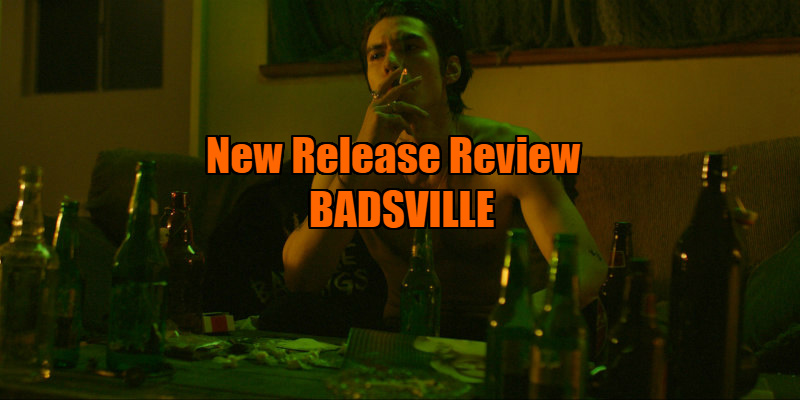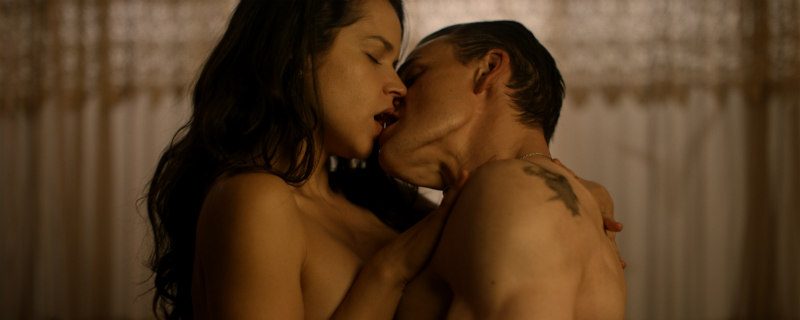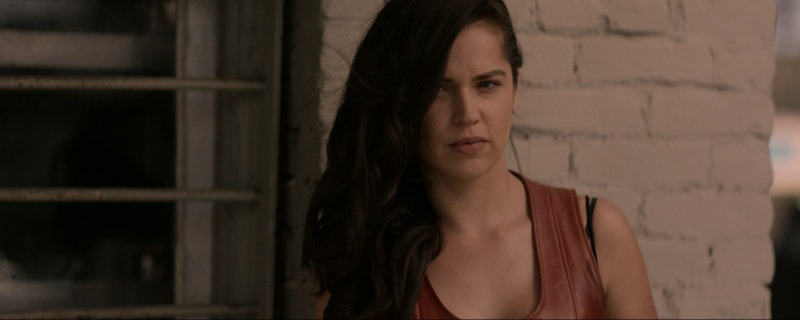
Review by Benjamin Poole
Directed by: April Mullen
Starring: Ian McLaren, Benjamin Barrett, Tamara Duarte, Emilio Rivera, Robert Knepper

Opening with a gruff voiceover wistfully enumerating the grim ghettopia of its setting - ‘a shit stain on map’ - Badsville wastes no time in establishing the civil hopelessness of its lower-working/criminal class as they eke out an existence within the titular ‘ville’; a rundown, gang ridden town, forgotten at the far south of California. The monologue, gruff as the edge of a matchbox, outlines the limited opportunities for young men within the area; "I learnt at a young age a king does what he’s got to do to stay on top," recounting the sort of ruthless clichés that all men secretly love to believe, and which constitute a societal contract within this ghost town where lead roadman and speaker Wink (who is probably getting a bit old for all of this nonsense), resides in sleazy splendour. To cap off the badboy bleakness of Badsville’s outlook, this desolation is expressed over scenes of petty violence, sinister mischief and, in unforgiving dusty close up, the dead as disco face of Wink himself.

In flashback, we learn more about Wink (Ian McLaren, who also scripts) as he was, with his de rigueur slicked back hair and tight-jeans-vest combo barely covering a body sculpted from shining muscle, and, in time honoured gangster tradition, his abiding affection for his dear old mam. We see that a heart thumps beneath Wink’s knife-edge physique as he cares for the dying woman, and thus sympathy is built for when she soon passes away, prompting our hero to consider a change in his ways. And here is where it gets interesting. The anti-hero-with-Oedipal-complex trope is expounded by Benjamin Barrett and McLaren’s screenplay, as Wink falls, almost immediately, for cute Suzy (Tamara Duarte) a waitress in the diner where Wink is a short order cook. Problem is, as ever, that Wink’s boy Benny (Barrett, also multitasking) is gay, a disposition which everyone else seems to realise and accept, except for Benny himself, who is at odds with his desire for the fellas and his own conditioned homophobia (he’ll pick up rough trade in a stupor, and then duff up the poor chap in self-disgust when they’re done). This explication of the gangster bromance trope is fascinating, probing what other blokey films coyly imply, but don’t dare to explore, with unflinching sensitivity.

But here’s the thing: nothing much changes in Badsville. Wink takes Suzy on a double date with Benny, and it’s ruined by Benny’s disregard of his own (female) partner. Poor Wink really made the effort too, bringing along the gift of a cheap teddy bear for Suzy, a woman who is in her early twenties. Travis Bickle taking Cybil Shepard to a porn film has nothing on the cluelessness of our guy, whose complete inexperience in relationships that aren’t coded within gang rules and regs is made sweetly clear. And, as these things generally do, the situation goes from bad to worse with some sort of beef (the details of which are irrelevant in their inevitability) with another gang, impacting upon the tentative couple and initiated by the most kinetic bar room brawl this side of Terminator 2.
One of the most impressive aspects of Badsville is how its clumsy and realistic violence contrasts the emotive dignity of character based sequences. Renaissance woman April Mullen directs with a sympathetic understanding of who these people are, and what limits their potential: Wink, Benny et al may live as stereotypes, but Mullen crafts characterisation that reveals deeper capacities and draws upon deep wells of sadness. DoP Russ De Jong’s iconography creates the sort of high plains Hispanic look that Robert Rodriguez would die for. The burnished mise-en-scene looks incredible, with a night time composed of electric blues and deep reds, a sensual and dangerously seductive world that contrasts the dirty, sun worn day time; it’s telling that Badsville’s major acts of violence usually happen in daytime, giving such territorial pissings a flat and pointless feeling. In a further bonus, the main baddie is played by Prison Break’s Robert Knepper, whose campy menace is put to its usual scary use. As the patriarch of a rival bunch, he’s too far gone to change now, and perpetuates the violence that establishes Badsville’s society; a lingering close-up on his visibly shocked son, whom he has beaten for being a ‘pussy’, finally goading him into a shocking act of violence, compounds the cycle.

As Badsville’s bros race about to a score of screaming guitars, and leather jackets are scuffed in further skirmishes, Mullen indulges every trope in the greaser gang book: but only because these characters live by a strict and repetitive code of cliché themselves. In a forgotten area of economic desperation and circumscribed opportunity, conforming to gang principles is a way to forge an identity, a way to fit in, with an ad hoc macho status tempered from stereotype and juvenile ideals. This film, which I loved, is a tragedy that takes masculinity as its psychomachia; the fatal tension between the expectation of the crowd and the hopes of the individual, between image and the person beneath. What does it mean to be a man in this town where love is contraband, and instead violence, love’s very opposite, abides? As befits this sincere and heartfelt film, at Badsville’s fatal conclusion, Mullen offers us no easy answers.

Badsville is due to release on VOD in February following a Canadian theatrical run on January 26th.

